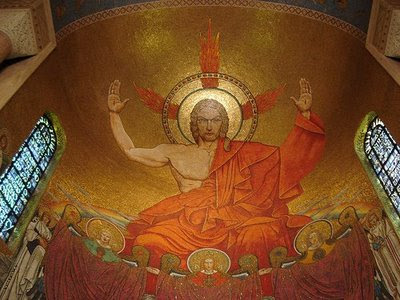May 28, 2006
Mark 16:15-20
Jesus can sit down because he knows that we are still at work. On this feast of the Ascension we celebrate the truth that Jesus has ascended and entered into glory—or to use the words of today’s gospel, “Jesus was taken up to heaven and sat down at God’s right hand.” But just because Jesus has sat down, does not mean that his work is finished. The Kingdom of God is not yet fully established. There is still violence and injustice in our world. Jesus will need to return at the end of time to finally establish God’s Kingdom in its fullness. Until the time when Jesus returns, he expects us to be active.
Jesus expects us to work for justice, to proclaim the good news of God’s love. This is what we are called to do. The gospel makes it clear. Jesus says to the disciples, “Go out to all the world and proclaim the gospel to the whole of creation.” This is our mission. The gospel also makes it clear that our mission cannot be successful unless it is accompanied by signs. Signs make other people take notice. They set us apart and validate the power and the truth of the message. Words are not enough! Signs are necessary if the gospel is to be fully confirmed and believed.
Now the difficulty in today’s gospel is that the signs that are listed there are peculiar and dangerous. We are told that we will cast out demons and handle snakes in our hands and drink deadly poison. I don’t recommend that you try any of these things at home. It is true that if they work, you’ll be on the evening news. But if they do not, you’ll be hospitalized. We need signs to accompany our message. So if the signs enumerated in the gospel are too extreme, we must find other signs to replace them. Let me suggest a few.
What if children not only obeyed their parents, and did so without complaining. What if they did what they knew they had to do even before they were asked? That would be different, wouldn’t it? That would cause people to notice. That action could be a sign of the Kingdom. What if parents occasionally set aside their work, set aside their household tasks and their multiple schedules and created a space where the family could simply gather. What if they could allow their families simply to be in one another’s presence, listening to one another’s lives, celebrating life together? That would be a change in the pattern of what’s expected, would it not? That choice could be a sign of the Kingdom. What if someone objected to having a co-worker or a fellow student belittled or refused to laugh at a racist joke? What if someone stood up to defend another who was being ignored? That would set that person apart, wouldn’t it? That could be a sign of the Kingdom. What if someone decided to be patient with another person who annoyed them, with someone who always got under their skin? What if instead of discounting that person or saying offensive things to them, a person would choose to listen and perhaps understand where that person was coming from? That would cause people to do a double take. That could be a sign of the Kingdom.
These are just a few examples. You can add your own. Whatever causes people to notice, sets us apart, goes against the grain—if it is orientated towards justice and love—can be a sign of the Kingdom of God. If we are going to fulfill our mission, we need such signs. Words are not enough! If our lives and actions are just like everyone else’s, no one is going to give much importance to the words we say. Then the proclamation of the good news will go unheard. Just because Jesus has ascended, do not imagine that his work is finished. He is calling upon us to act. He is counting on us to proclaim the gospel. Jesus can sit down because he knows that we are still working—working in such a way that our lives can be signs of the Kingdom, working so that our lives might give authority to the words that we say.

